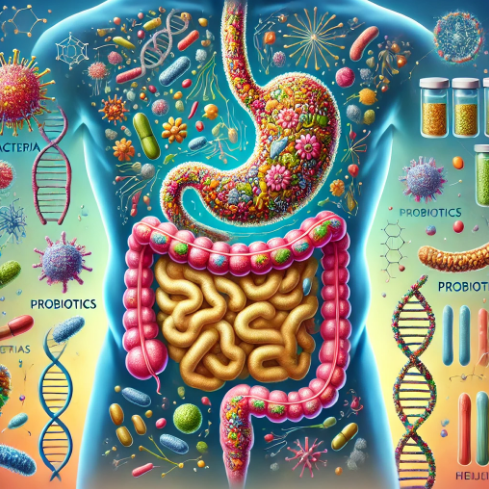Introduction The human microbiome, the collection of trillions of microorganisms living on and inside our bodies, plays an essential role in maintaining health. These microorganisms, especially those in the gut, contribute to functions such as digestion, immune system regulation, and even brain function. The field of microbiome-based therapies is a rapidly emerging area of research, aiming to manipulate the microbiota to treat diseases ranging from gastrointestinal disorders to metabolic and neurological conditions. In this article, we will explore the potential of microbiome-based therapies, their clinical applications, challenges, and the future of this innovative pharmaceutical frontier.
How Microbiome-based Therapies Work
Microbiome-based therapies work by altering the microbial environment within the human body to promote better health. The microbiome, especially that found in the gut, plays a vital role in a wide range of physiological processes. Dysbiosis, an imbalance in microbial populations, has been linked to various conditions, including inflammatory bowel disease (IBD), obesity, diabetes, depression, and more.
- Probiotics: These are live beneficial bacteria that can be consumed to restore balance to the microbiome. They are commonly used to support digestive health but are increasingly being explored for more specific therapeutic purposes.
- Prebiotics: These are compounds that promote the growth of beneficial bacteria in the gut. They act as food for probiotics and other beneficial microorganisms.
- Fecal Microbiota Transplantation (FMT): This procedure involves transferring stool from a healthy donor into the gastrointestinal tract of a patient to restore healthy gut flora. It has shown remarkable success in treating recurrent Clostridioides difficile infections.
- Microbiome-modulating drugs: Some drugs are being developed to selectively target and alter specific populations of microbes in the body.
Current Applications of Microbiome-based Therapies
- Gastrointestinal Disorders Microbiome-based therapies are most notably used in treating gastrointestinal diseases. FMT has been a breakthrough treatment for recurrent C. difficile infections, achieving high cure rates when antibiotics fail. Moreover, researchers are investigating how microbiome-targeted therapies can benefit patients with inflammatory bowel disease (IBD), including Crohn’s disease and ulcerative colitis, where gut flora imbalances are implicated.
- Metabolic Conditions Obesity and type 2 diabetes have been linked to changes in the gut microbiota. Studies have shown that certain bacterial populations in the gut can influence the body’s metabolism and the storage of fat. Probiotics and prebiotics are now being investigated for their ability to help manage weight and improve insulin sensitivity in patients with metabolic syndrome.
- Cancer Treatment Emerging research suggests that the microbiome can influence the effectiveness of certain cancer therapies, particularly immunotherapies. By modifying the gut microbiota, it may be possible to enhance the immune system’s ability to fight tumors. Clinical trials are exploring the combination of microbiome modulation with immune checkpoint inhibitors in treating cancers like melanoma and colorectal cancer.
- Neurological Conditions The gut-brain axis—the communication network between the gut and the brain—has gained considerable attention in recent years. Alterations in the gut microbiome have been linked to mood disorders like depression and anxiety, as well as neurodevelopmental conditions like autism spectrum disorders. Microbiome-based therapies are being tested as potential treatments to regulate mood and behavior by modulating gut flora.
Challenges and Ethical Considerations
Despite the exciting potential of microbiome-based therapies, several challenges remain. One of the biggest hurdles is the complexity of individual microbiomes, which vary significantly from person to person. This variability makes it difficult to develop standardized treatments that are universally effective. Additionally, while FMT has shown promise, the long-term safety and potential side effects of manipulating the gut microbiome are not yet fully understood.
Another ethical challenge lies in the regulation and accessibility of these therapies. FMT, for instance, is still not widely available, and there are concerns about the safety and regulation of donor materials. The development of personalized microbiome therapies could also lead to disparities in access, with advanced treatments potentially being limited to wealthier individuals or regions.
The Future of Microbiome-based Therapies
As researchers continue to uncover the complex interactions between the microbiome and human health, the future of microbiome-based therapies looks bright. Several areas hold great promise:
- Personalized Microbiome Treatments Advancements in genetic sequencing and bioinformatics are paving the way for highly personalized microbiome treatments. By analyzing an individual’s unique microbiome, clinicians will be able to develop customized therapies tailored to their specific microbial profile.
- Gene Editing for Microbiome Manipulation CRISPR technology is being explored as a tool for editing the genomes of bacteria within the microbiome. This could allow for the targeted removal or modification of harmful bacteria or the enhancement of beneficial microbes, opening up a new frontier in microbiome-based therapies.
- Combination Therapies Microbiome modulation may increasingly be used in combination with other treatments, such as immunotherapies and chemotherapy. By altering the microbiome, researchers hope to improve patient responses to these therapies, particularly in difficult-to-treat diseases like cancer.
- Expanded Clinical Trials As microbiome research advances, we can expect to see more extensive clinical trials exploring its role in treating a wider range of conditions, including autoimmune diseases, allergies, and even aging-related disorders. Regulatory frameworks will also need to evolve to accommodate these new therapies, ensuring their safety and effectiveness.
Conclusion
Microbiome-based therapies represent an exciting and innovative frontier in pharmaceutical research. From treating gastrointestinal disorders to improving the effectiveness of cancer treatments and managing neurological conditions, the potential applications of these therapies are vast. While challenges remain, particularly in the areas of standardization and safety, the future holds great promise for personalized microbiome treatments. As we deepen our understanding of the microbiome’s role in health and disease, these therapies could transform the landscape of modern medicine.
References:
- Lynch, S. V., & Pedersen, O. (2016). “The human intestinal microbiome in health and disease.” New England Journal of Medicine, 375(24), 2369-2379.
- Turnbaugh, P. J., et al. (2007). “The human microbiome project.” Nature, 449(7164), 804-810.
- Ridaura, V. K., et al. (2013). “Gut microbiota from twins discordant for obesity modulate metabolism in mice.” Science, 341(6150), 1241214.

